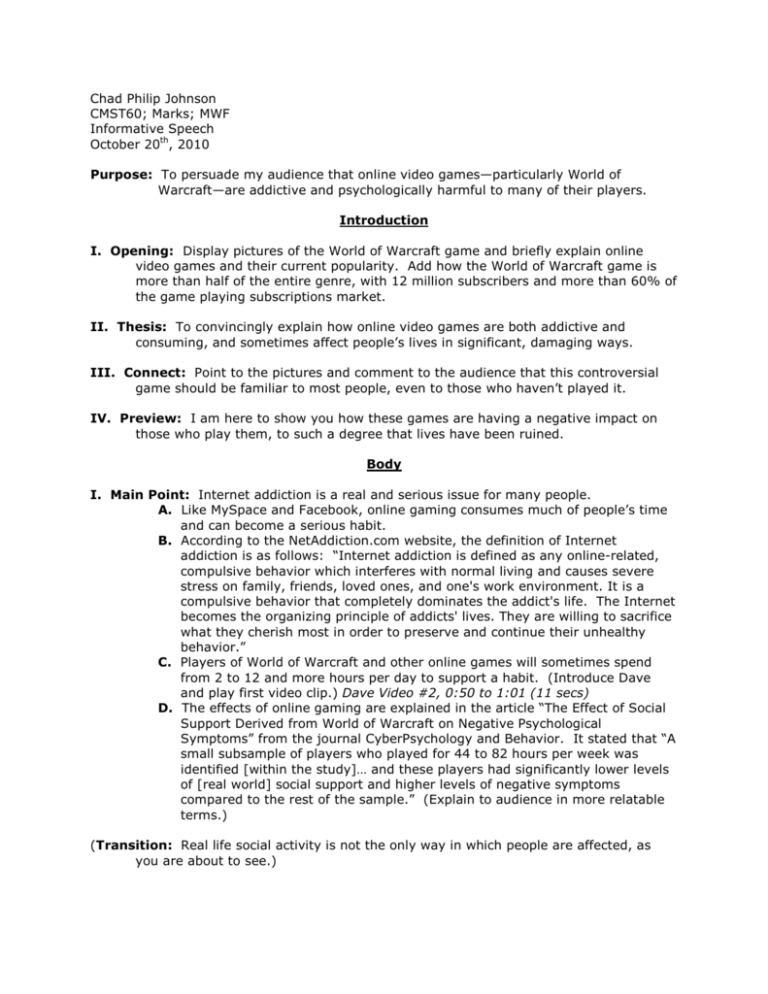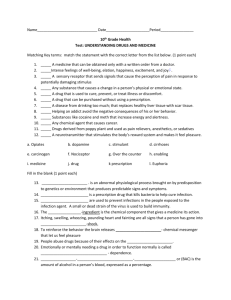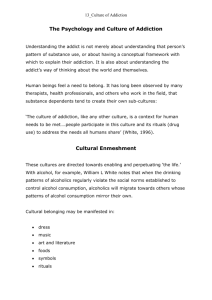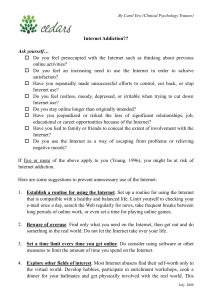Persuasive Speech Preparation Outline
advertisement

Chad Philip Johnson CMST60; Marks; MWF Informative Speech October 20th, 2010 Purpose: To persuade my audience that online video games—particularly World of Warcraft—are addictive and psychologically harmful to many of their players. Introduction I. Opening: Display pictures of the World of Warcraft game and briefly explain online video games and their current popularity. Add how the World of Warcraft game is more than half of the entire genre, with 12 million subscribers and more than 60% of the game playing subscriptions market. II. Thesis: To convincingly explain how online video games are both addictive and consuming, and sometimes affect people’s lives in significant, damaging ways. III. Connect: Point to the pictures and comment to the audience that this controversial game should be familiar to most people, even to those who haven’t played it. IV. Preview: I am here to show you how these games are having a negative impact on those who play them, to such a degree that lives have been ruined. Body I. Main Point: Internet addiction is a real and serious issue for many people. A. Like MySpace and Facebook, online gaming consumes much of people’s time and can become a serious habit. B. According to the NetAddiction.com website, the definition of Internet addiction is as follows: “Internet addiction is defined as any online-related, compulsive behavior which interferes with normal living and causes severe stress on family, friends, loved ones, and one's work environment. It is a compulsive behavior that completely dominates the addict's life. The Internet becomes the organizing principle of addicts' lives. They are willing to sacrifice what they cherish most in order to preserve and continue their unhealthy behavior.” C. Players of World of Warcraft and other online games will sometimes spend from 2 to 12 and more hours per day to support a habit. (Introduce Dave and play first video clip.) Dave Video #2, 0:50 to 1:01 (11 secs) D. The effects of online gaming are explained in the article “The Effect of Social Support Derived from World of Warcraft on Negative Psychological Symptoms” from the journal CyberPsychology and Behavior. It stated that “A small subsample of players who played for 44 to 82 hours per week was identified [within the study]… and these players had significantly lower levels of [real world] social support and higher levels of negative symptoms compared to the rest of the sample.” (Explain to audience in more relatable terms.) (Transition: Real life social activity is not the only way in which people are affected, as you are about to see.) II. Main Point: Physical and mental health are also impacted by addictions to online gaming. A. Time spent in front of a monitor screen offers no physical activity whatsoever and online video games are designed in a way that invites a person to spend more and more time on the computer. Dave Video #2, 1:08 to 1:21 (13 secs) B. The addiction can become so great that it resembles a drug habit. Dave Video #2, 1:24 to 1:49 (25 secs) C. China and South Korea cite video game addiction as their number one public health issue. D. In the Fortune article “Spoils of Warcraft”, the interface for the South Korean version of World of Warcraft has been designed in a way where it is easier to operate with one hand, since so many gamers there smoke while they play. (Transition: However, many do not view video game habits such as these as being harmful, and have a more positive outlook.) III. Main Point: Many professionals believe that addiction to video games and online games does not even exist. A. The article “A New Perspective on Game Addiction” from the website WhatTheyPlay.com offered some insight into this perspective. Cheryl K. Olson, co-director of the Center for Mental Health and Media at Massachusetts General Hospital’s Department of Psychiatry, said, "Kids who have other problems will sometimes channel those through video games. A depressed kid will play video games to improve their mood. And kids with addictive personalities will play a lot of video games. Like anything that can go to an extreme, video games might become an additional problem, but usually the games, by themselves, are not the problem." B. From the aforementioned Fortune article, it also stated that “Players of World of Warcraft were found to derive social support from playing and a positive relationship was found between game engagement and levels of in-game social support.” (Transition: As we have already seen with Dave, playing the game World of Warcraft became more important to him than smoking marijuana.) IV. Main Point: Video game addiction affects all different types of people. A. The article from the WhatTheyPlay.com website offered a glimpse of the struggle endured by Ryan G. Van Cleave, Ph.D, author of the book Unplugged: My Journey Into the Dark World of Video Game Addiction. It shared that "Ultimately, Van Cleave’s addiction cost him a tenure-track university job, his financial future, his friends, his dignity, and very nearly, his life after a suicide attempt...." B. Dr. Van Cleave survived his addiction to write a book, offer support and share his story with others. However, like Dave, it certainly was not without great difficulty. Dave Video #3, 2:23 to 2:40 (17 secs) C. In Dave’s case, it is quite clear that there are many similarities between gaming addiction and a drug habit. Dave Video #3, 4:19 to 4:35 (16 secs) Conclusion I. Summary: As I have explained to you today, online gaming addiction is very serious problem that is affecting an increasing number of people. A. It impacts and limits real-life social interactions. B. Physical and mental health can be affected. C. All different kinds of people. I. Call to Action: I encourage everyone to pay more attention to those in their lives that play video games, especially online, and remember the different ways that they could potentially be affected. A. Offer a handout with information, videos and further reading. II. Closing: I hope that you better understand how something as seemingly harmless as playing video games can lead to serious addiction. References Dave. dvdwmplr's Channel. Retrieved October 20, 2010 from, http://www.youtube.com/user/dvdwmplr Gaudiosi, J. (2010). A New Perspective on Game Addiction. Retrieved October 19, 2010 from, http://www.whattheyplay.com/features/a-new-perspective-on-game-addiction/ Levine, R. (2007). Spoils of warcraft. Fortune, 155(5), 151-156. Longman, H., O'Connor, E., & Obst, P. (2009). The effect of social support derived from world of warcraft on negative psychological symptoms. CyberPsychology & Behavior, 12(5), 563-566. No author. (2009). FAQs on Internet Addiction. Retrieved October 19, 2010 from, http://www.netaddiction.com/index.php?option=com_content&view=article&id=65&I temid=89








